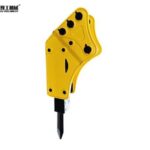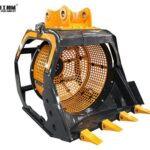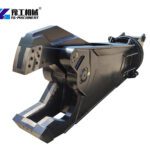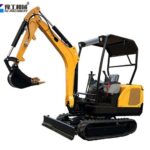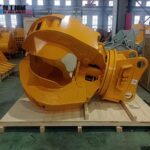Hydraulic hammer for excavator for sale, also known as a breaker or demolition hammer, is a powerful tool attached to an excavator. It uses hydraulic pressure to deliver repeated blows to break up materials such as concrete, asphalt, and rock. Hydraulic hammers are an essential attachment for excavators in demolition, excavation, and construction work. Hydraulic hammers work by converting hydraulic fluid pressure into mechanical energy. The excavator provides the necessary hydraulic pressure through its auxiliary hydraulic system. This pressure powers the hammer’s piston, which drives the striking tool against the anvil. The rapid, repeated impacts generated by the striking tool break up the material.
Considerations When Buying a Hydraulic Hammer
1. Excavator Compatibility
The first step in choosing a hydraulic hammer for excavator for sale is ensuring it aligns with your excavator’s specifications.
2. Job Requirements and Material Hardness
The type of material you’ll be breaking dictates the hammer’s required impact energy.
3. Hammer Design and Durability
Look for features like auto-lubrication systems, heat-treated pistons, and replaceable wear parts. A robust design reduces downtime and maintenance costs.
4. Budget and Total Cost of Ownership
While upfront cost matters, prioritize long-term value.
Benefits of Investing in a Hydraulic Hammer for Excavator for Sale
1. Enhanced Efficiency and Productivity
Hydraulic hammers reduce manual labor and accelerate project timelines. Contractors report up to a 40% increase in demolition speed compared to traditional methods.
2. Versatility Across Applications
From roadwork to underwater demolition, modern hydraulic breakers adapt to diverse environments. Some models feature silenced technology for urban projects or extreme-temperature kits.
3. Cost Savings Over Time
High-quality hammers minimize repair costs and extend equipment lifespan. For example, heat-treated tool steel chisels withstand 2–3 times more impacts than standard models.
Maintenance Tips for Hydraulic Hammers
- Daily Inspections: Check for hydraulic leaks, loose bolts, and tool wear.
- Proper Lubrication: Use manufacturer-recommended grease to prevent piston seizing.
- Avoid Overheating: Monitor hydraulic fluid temperature; prolonged use above 180°F damages seals.
- Store Correctly: Clean the hammer after use and store it upright to prevent moisture ingress.

